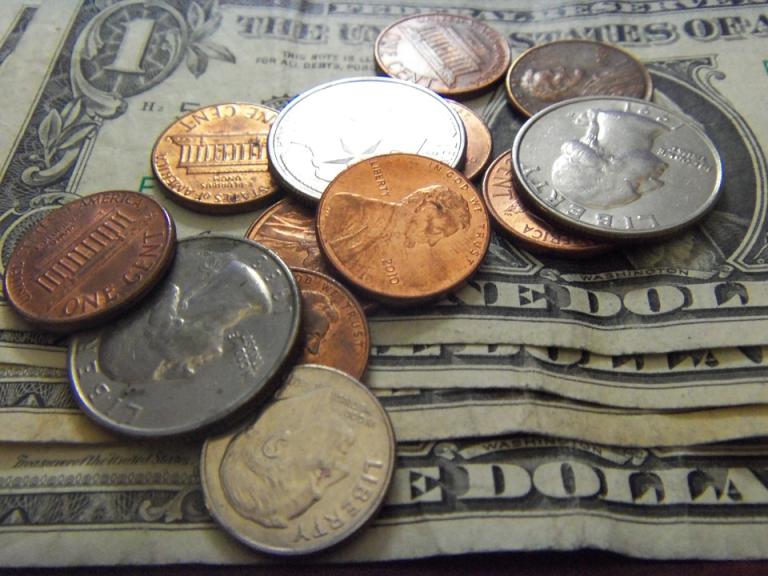Editors’ Note: This article is part of the Patheos Public Square on Charitable Giving. Read other perspectives here.
When I was a little kid, I got an allowance of a dollar. I can’t tell you if that was above or below the average for the mid-1970s when I was a little kid, but I can tell you that it was a dollar. Why? Because every week I took my offering envelope, wrote my name on it in careful first-grader printing, put a dime inside, and took it to church to give 10% of my income to God. (I haven’t been at a church that actually uses envelopes in years now, so in case you have never seen an offering envelope, go here. No, this is not a product placement for Cokesbury. It’s just because I used to be a reference librarian and can’t help it.)
I have learned since that there is a huge debate raging over whether Christians should tithe at all (again, this is not a product placement for this book, just the reference librarian at work) or if the 10% standard is from a previous dispensation and Christians are to give freely out of grace. I have also even more recently learned that there are debates raging about whether Christians, or anybody, should give charitably at all, especially through what some have named the “poverty-industrial complex,” or whether we should let entrepreneurship and the market do their work. I learned the latter through watching “Poverty, Inc.,” which is worth your time to chew on even if you end up disagreeing with it, which I am very much still on the fence about. (It was even years before I found out that when the preacher asked us for our tithes and offerings he or she was not using synonyms; the offerings are supposed to be what is given over and above the tithes.)
My father had come into the ordained ministry from being “in business,” though he repeatedly tried to get jobs in business with his theological training after he’d acquired it–looking for the modern faith and work movement before it fully existed. He ended up serving for 10 years as a local church pastor, and eventually became the business administrator for a church judicatory, which is exactly the kind of job he was made for. All of that made him a rarity in my childhood: a pastor who wasn’t afraid to talk about money. Why the church needed it and when it didn’t. What giving money did to and for the recipient, and what it did to and for the giver. And very early on, by doing so, he taught me the lesson that what I had was not mine; that everything was gift.
The lesson was imperfectly learned, to be sure. I tithed my allowance and later my college-student earnings and then, at age 25, I got my first real job. 10% of $22,000? (It was the mid 1990s, so that’s not as bad as it sounds.) Well, there’s a famous quote attributed to Everett Dirksen: “A billion here, a billion there, and pretty soon you’re talking about real money.” $2200 looked like real money.
My giving dropped to around 5% of my income. It stayed there until in 2009 I met a relative of my husband’s who casually remarked that he took his giving up 1% every year and, in 2009, was giving 32% of his income to charitable causes. Well now. At that point my husband and I made the commitment to try to do the same–and then, shortly afterwards, lost the majority of our employment, leading to a revised commitment to maintain our giving at the same level, until we became employed again, at which point we’ve started the rise towards tithing. You can do the math. 🙂
I bring all this up for two reasons. The first is because, like my father before me, I do think it’s OK for pastors to talk about money, even in the nitty-gritty details. Money may not, as my friend Sarah Conrad Sours says, ultimately exist; but it is a means of exchange in our society, and we “religious folks” should never treat it as though it’s not something to talk about when we’re being “spiritual.” Either all of life is capable of falling under the mantle of God’s Kingdom, or none. I’m throwing my lot in with all. If we were willing to see money as a means of spiritual exchange maybe churches wouldn’t fight so often over the new carpet. (That doesn’t mean they’d always get the new carpet. Just that their decision, whatever it is, would be motivated by thoughtful discernment.)
But I bring it up secondly because it is worth reminding many of us that all of what we have is gift. Especially those like me who benefit from a lot of privilege by virtue of our class and race. Maybe, as the “Poverty Inc.” folks say, we should give shrewdly; maybe, as William Droel said yesterday, we should give extravagantly without regard for where the chips fall. Maybe we give, not always through money, but through speaking up and speaking out and standing with others. (In the service of which I will tell you right now that you need to be reading the blogs of some people who are speaking up and standing out: Chanequa Walker-Barnes, Kathy Khang, and Dilshad Ali).
My daughter is 9. We give her 2 dollars a week for allowance. I didn’t exhaustively research this on mommy-blogs or conduct extensive crowdsourcing on Facebook or even calculate for cost of living. I just figured that if I got a dollar a week in 1979 it was probably about time to double the rate. When I first gave it to her, I said, “Now, every week, you take 20 cents out of this and we’ll take it to church.”
“Why?” she said.
So when you’re older, I thought to myself, we can have this conversation about how slowly, throughout my life, I have been learning how to stand at my window, look out at the world, look around at how tightly I hold on to my life, and let go.
“Because,” I said, “your grandpa taught me that all of life belongs to God, including your dimes.”













